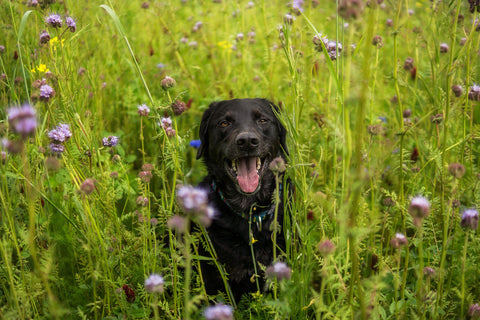
5 Common dog skin concerns and how you can help
Is your doggy scratching more than usual, or licking or chewing particular areas of their skin? Maybe you’ve noticed that their coat isn’t looking quite as bright and shiny as normal? This article offers some hints and tips to help you spot and address the signs of problem skin.
At Lintbells, we’re a team of dog-lovers and we regularly speak to people who are worried about the condition of their dog’s skin.
We’re passionate about helping your pooch feel their best. Here are the top concerns our customer service team often come across, along with hints about how you can help, and when you should consider visiting your vet to get things checked out:
1. General scratchiness
It’s not surprising that dogs get itchy. They have a coat that snags foliage, bugs, and other undesirable creepy-crawlies, and they can easily pick up mites or fleas that bite and irritate the skin. We all know what it’s like to see our dogs frantically scratching, and even chewing or biting the area that’s bothering them. This scratching should be addressed as soon as possible to avoid the skin breaking.
What you can do: Keep your dog’s coat trimmed if they have long hair to avoid it picking up half the hedgerow on your evening walk. Regularly check them over for ticks and other bugs that you can see and give them a brush to try and get rid of anything you can’t. If your dog scratches a little too enthusiastically, consider applying a soothing cream like our YuCARE skin cream to avoid more serious problems.
When to visit your vet: Always investigate the area your dog is scratching. If the skin is red, discoloured, swollen, or doesn’t look like the surrounding skin, you may need to take further action. (Also remember your vet is a great help in keeping flea treatments up-to-date!)
2. Allergies and digestive issues affecting the skin
Some dogs have food allergies, just like their humans. If you’ve noticed that your dog has recently become more prone to scratching or their skin condition has changed noticeably, it could be that they’ve eaten something that has triggered a reaction. Food allergies can have a range of other consequences, so the sooner you can help your pooch out, the better.
What you can do: Think about whether you have changed anything in your dog’s diet recently. Might they have been given food that’s not part of their usual diet at the kennels or by a dog sitter? If you can trace this, you could be able to solve the itchy-dog mystery. If not, you could try cutting things out of the existing diet for adjustment – it’s a long, slow process, but worth.
When to visit your vet: If your dog suffers from a clear allergic reaction to something they have eaten, take them to the vet straight away – just like humans, allergic reactions should be taken seriously. If you have retraced their diet and adjusted their food but your dog is still continuing to scratch and their coat is dulling, you may want to visit your vet for advice.
3. Your dog and the outside world

As well as food, your dog can be allergic to things found in their environment. For example, some dogs are allergic to flea bites, so may have a reaction where other dogs will not. Similarly, your dog’s skin can be affected by pollen which can create a horribly persistent itch. Read our blog on how to help your dog if you think they have a pollen allergy as this can affect them all year round.
What you can do: You can’t diagnose these types of allergens on your own, but by keeping an eye on your dog, you might be able to relate your dog’s scratching to a particular walk or event. You can try to make sure that your dog’s diet and supplements are made of only natural ingredients to avoid reactions to nasty chemicals, and perhaps consider giving supplements that help calm troubled skin. Our YuDERM Itchy Dog is packed with essential oils to specifically help dogs with sensitive or itchy skin.
When to visit the vet: As with food allergies, if your dog becomes suddenly unwell or seems to be very unhappy, you should take them to the vet to get checked out. If you’ve noticed similar behaviour before, mention this to your vet, as this might show a pattern which can be related to an allergy.
4. Dull coat and bald patches
We all want our dogs to have beautiful shiny coats with a full covering of hair, but for some dogs, sadly, this isn’t the case. Where dogs have lost hair, you’ll find bald patches - and this makes your dog’s skin more vulnerable. Some dogs, such as German Shepherds, Labrador Retrievers, and Siberian Huskies tend to moult far more frequently than others, and some may go through periods of excess moulting, which can make their owners concerned.
What you can do: An all-natural skin and hair supplement is a great first step to help combat shedding and can improve the quality of your dog’s coat. Adding something like this to your dog’s diet can help to restore their coats to the shiny, healthy condition they deserve to be in. You should also regularly check the areas that aren’t completely covered by the coat, to make sure that they are as healthy as possible.
When to visit the vet: In less common cases, hair loss may be part of a wider issue. If your dog is losing a lot of hair, or the lost hair is not growing back, you should take your pooch to the vet for advice.
5. Itchy, dry, flaky skin?
Our dogs find dry itchy skin as annoying as we do! It’s distracting and can make your dog very unhappy. In many cases, flaky skin is linked to parasites, although there can be other reasons for this dandruff-like concern, including allergies and other irritants. The good news is that you can help your furry friend beat the itch.
What you can do: Some shampoos and cleaning products can affect the balance of your dog’s skin. Try moving to products with natural ingredients, and perhaps reducing bathing or cleaning to give your dog’s skin a break. You could also use a specially-formulated natural hair and skin boosting product that adds precious Omega 3 and 6 oils, helping to calm skin and soothe itchiness.
When to visit the vet: If there’s no sign of your dog’s skin returning to normal, or you’re concerned about the amount of scratching or distress your pooch may be in, make an appointment to see your vet.
Our natural supplements provide vital nutrients that can help to boost shine and soothe the dreaded itch. Check out our complete skin and coat range, or call one of our team for advice on 01462 416866.
Do you have your own tips for soothing your dog’s itchy skin? Join us on Facebook and Instagram and share your knowledge with our community of like-minded and dedicated pet-lovers.








